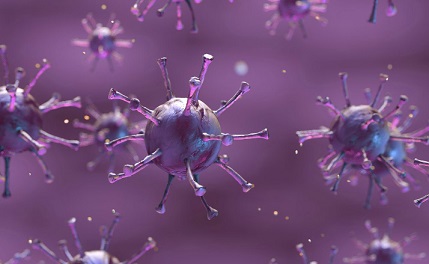COVID-19 News: Boston University Study Finds That Calreticulin Regulates SARS-CoV-2 Spike Protein Turnover And Modulates Infectivity
Nikhil Prasad Fact checked by:Thailand Medical News Team Nov 25, 2023 1 year, 4 months, 3 weeks, 4 days, 19 hours, 14 minutes ago
COVID-19 News: The global health crisis triggered by the severe acute respiratory syndrome coronavirus 2 (SARS-CoV-2) has brought the intricate dance between the virus and the human body into sharp focus. Among the myriad clinical manifestations of coronavirus disease 2019 (COVID-19), cardiovascular complications have emerged as significant hallmarks. In the quest to understand the mechanistic details of SARS-CoV-2 infectivity in endothelial cells, a pioneering study from Boston University covered in this
COVID-19 News report, has unveiled a previously unexplored protagonist in this viral drama - calreticulin (CALR).
 SARS-CoV-2 Infection Dynamics in Endothelial Cells
SARS-CoV-2 Infection Dynamics in Endothelial Cells
At the forefront of SARS-CoV-2's assault on host cells is the spike glycoprotein (S protein), responsible for facilitating viral entry into host cells by attaching to receptors and attachment factors. While angiotensin-converting enzyme 2 (ACE2) is widely recognized as the primary entry receptor, endothelial cells, critical components of blood vessels, exhibit low or undetectable ACE2 expression. This has prompted researchers to delve into alternative receptors, such as CD209L/L-SIGN and vimentin, for SARS-CoV-2 infection of endothelial cells.
The study takes an unexpected turn as it reveals that the receptor-binding domain (RBD) of the S protein shares structural similarities with the proline-rich binding ena/VASP homology (EVH1) domain. This discovery sets the stage for the identification of a novel interaction - the binding of S-RBD to the endoplasmic reticulum (ER) resident calreticulin (CALR), a calcium-binding chaperone.
Decoding Calreticulin's Interaction with the SARS-CoV-2 Spike Protein
The researchers meticulously demonstrate that CALR interacts with S-RBD through its proline-rich (P) domain, introducing a previously unexplored facet to CALR's repertoire. This interaction proves pivotal in modulating the proteostasis of the S protein. To unravel the intricacies of this regulation, the study employs an array of biochemical analyses, including a puromycin pulse-chase experiment, highlighting CALR's crucial role in regulating the turnover of the SARS-CoV-2 spike protein.
Venturing further into the fate of the S protein, the research investigates cellular degradation pathways. Surprisingly, the findings indicate that CALR regulates the levels of the S protein via lysosomal-dependent degradation. The lysosomal/autophagy inhibitor bafilomycin 1A emerges as a key player, selectively augmenting S protein levels in a CALR-dependent manner. This unveils a previously unrecognized facet of CALR's function in the ER-lysosome-dependent proteolysis of the spike protein.
Implications for SARS-CoV-2 Infectivity and Cardiovascular Health
The study takes a significant leap by exploring the impact of CALR on SARS-CoV-2 infectivity. Utilizing shRNA-mediated knockdown of CALR, the researchers observe a marked increase in SARS-CoV-2 infection and a simultaneous impairment of calcium homeostasis in human endothelial cells. This discovery suggests that CALR plays a pivotal role in determining the infectivity of
SARS-CoV-2, providing crucial insights into potential connections between CALR, calcium homeostasis, and the cardiovascular complications observed in COVID-19 patients.
Mechanistic Insights and Future Directions
As the study unravels the molecular intricacies of the interaction between S-RBD and CALR, it prompts a cascade of questions and avenues for further exploration. The unique recognition of the S-RBD by CALR via its P domain, distinct from its carbohydrate recognition function, adds a layer of complexity to our understanding of CALR's versatile roles.
The study's focus on CALR's impact on lysosome-mediated degradation raises questions about its potential influence on SARS-CoV-2 intracellular trafficking, a critical aspect of the virus life cycle. Additionally, the researchers ponder whether CALR's interaction with the S protein extends beyond intracellular domains to potential extracellular interactions. Exploring these aspects could offer a more comprehensive understanding of the intricate interplay between CALR and SARS-CoV-2.
Conclusion
In conclusion, the study from Boston University emerges as a beacon illuminating a previously unrecognized regulator in the elaborate choreography between SARS-CoV-2 and host cells. Calreticulin takes center stage as a key player in the regulation of SARS-CoV-2 spike protein proteostasis and infectivity, with far-reaching implications for cardiovascular complications in COVID-19 patients. As we navigate the complex landscape of viral pathogenesis, this research not only opens doors to novel therapeutic avenues but also underscores the urgency of unraveling the molecular nuances of virus-host interactions. The quest to decipher the molecular ballet between SARS-CoV-2 and host cells holds promise for advancing our understanding of viral infections and informing the development of targeted antiviral therapeutics.
The study findings were published in the peer reviewed journal: Cell.
https://www.mdpi.com/2073-4409/12/23/2694
For the latest
COVID-19 News, keep on logging to Thailand Medical News.
